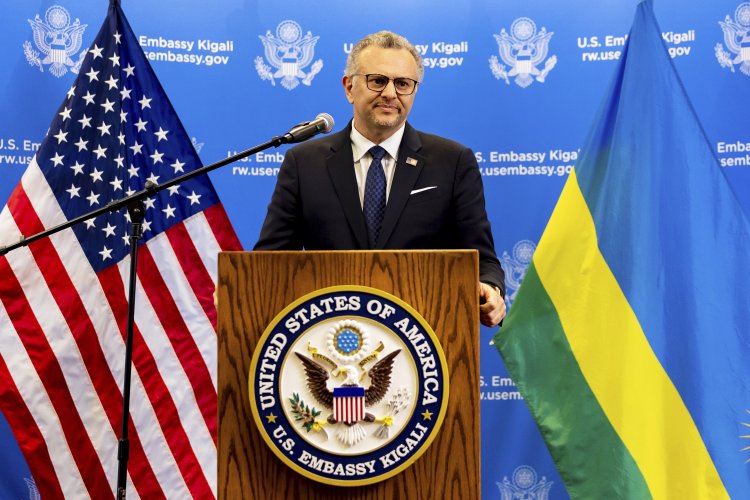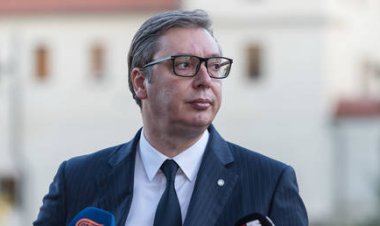'Tiffany Trump’s father-in-law finds diminished role post-transition, "Everyone knew it but him"'
Massad Boulos' journey to attain power serves as a compelling example of Trump-era political dynamics.

Boulos, who is the father-in-law of Tiffany Trump, had indicated during the transition that he would wield considerable influence over the administration's foreign policy, yet this incident demonstrated his initial struggle to gain significant leverage, despite some unexpected successes in the interim.
His mixed reputation serves as a lens into the dynamics of power within Trump’s inner circle. Although family connections appear important to the president, they seem to have limits. PMG spoke to 10 anonymous sources familiar with Boulos’ interactions within the administration. They depicted a figure who has received formal titles lacking clear responsibilities and has often been excluded from critical discussions or brought into negotiations after the bulk of the work was done. Several sources noted that Boulos’ actions have led to frustration within both the White House and the State Department, contributing to strained relationships across the administration.
Since joining Trump's team, Boulos has sometimes overstated his role in the administration. He has distributed business cards that exaggerate his title, failed to inform the State Department in advance about sensitive meetings, and frequently implied that his scope of work is broader than it is. Reports suggesting that Boulos misrepresented his wealth and business holdings before entering government also did not resonate well with some people within the administration.
During the transition last year, Trump appointed Boulos as a senior adviser on the Middle East, during which he began informal meetings with Lebanese officials and other diplomats. However, some in the administration contended that he was overreaching. “The job was more symbolic, but he didn’t know that,” noted an administration official. “Everyone knew it but him.”
Despite being appointed as Africa adviser in early April, Boulos retains the title of senior adviser on Arab and Middle Eastern affairs, though sources say he is not expected to work actively on Middle Eastern issues. Boulos chose not to comment, but administration representatives supported his role in Trump’s Africa policy. National Security Council spokesperson James Hewitt stated, “Boulos is a valuable member of the president’s foreign policy team and has already made great progress in strengthening U.S. ties with African nations.”
A senior government official confirmed the circumstances surrounding Boulos’ April trip, explaining that he and his team waited at Andrews and made changes due to technical reasons, opting for commercial flights instead. They visited Congo, Rwanda, Kenya, and Uganda, with plans for Boulos to travel to Angola and other locations in the Great Lakes region soon after.
Currently, Boulos serves as Trump’s primary Africa adviser by default, as the administration has yet to appoint an assistant secretary of state for Africa at the State Department or on the NSC. A State Department press release regarding his appointment provided minimal information about his specific responsibilities. This limited role does not afford Boulos the extensive authority held by some of Trump’s allies, who operate outside conventional power structures.
“He’s not Ric Grenell, he’s not Steve Witkoff,” remarked a GOP foreign policy operative, referring to other Trump confidants with broader mandates who report directly to the president. In contrast, Boulos operates within the Africa bureau of the State Department and functions under senior diplomats' authority.
Boulos has achieved some foreign policy victories, including engaging with African heads of state and facilitating initial steps toward a deal between Congo and Rwanda to address violence in eastern Congo. Secretary of State Marco Rubio recently praised Boulos during a Cabinet meeting, commending him for contributing to the deal signed by the Congolese and Rwandan foreign ministers. His contributions were also corroborated by multiple sources aware of U.S. efforts related to the deal. “Mr. Boulos is doing an exceptional job, as evidenced by the deal … between the DRC and Rwanda,” a White House spokesperson stated.
However, Boulos has often operated away from public scrutiny, lacking the profile enjoyed by other Trump envoys. For instance, Steve Witkoff frequently represents the president in traveling delegations, such as during his meeting with French President Emmanuel Macron in Paris last month.
Boulos faced additional challenges stemming from early media interviews where he claimed to be a leading voice on Lebanon policy, creating tension within Trump’s inner circle. Additionally, a New York Times article revealed that he had misled the public about the origins of his wealth for years. Two sources mentioned that Boulos developed an unfavorable reputation for his frequent dialogue.
His departure from Middle Eastern work was fueled by concerns regarding his political and social ties in the region. Originally hailing from northern Lebanon, Boulos immigrated to the U.S. as a teenager. His son, Michael, is married to Tiffany Trump, and the couple is expecting their first child this year. Concerns have also arisen over Boulos' political connections in Lebanon. While he maintains that he has no political affiliations, he has close ties with Lebanon's Christian political class, including connections to Suleiman Frangieh, Hezbollah's favored presidential candidate earlier this year.
Boulos has attempted to sway Middle East policy and discussed Lebanon and Syria in interviews with Arab media. Officials noted that his attempts to go beyond his assigned responsibilities have caused confusion in the region. “He publicly speaks on issues and topics he is not responsible for or involved in, causing confusion in the region. It's been an issue,” remarked an administration official.
Another source noted that Boulos does handle some Middle Eastern responsibilities from his office in the Africa affairs bureau, coordinating with the secretary of state and the president. He distributes a business card listing his State Department email and phone numbers, labeling himself as “senior advisor to the president,” which significantly inflates his official title and adds to the confusion regarding his actual responsibilities.
Some within the White House and State Department have expressed dissatisfaction with instances where Boulos took initiative, interpreting it as counterproductive freelancing. Boulos participated in an Arabic interview where he questioned U.S. recognition of Morocco’s sovereignty over the disputed Western Sahara territory, jeopardizing a crucial element of U.S. negotiations with Morocco aimed at formalizing diplomatic ties with Israel. His comments upset the Moroccan government. Following the backlash, he posted on X about Rubio's strong reaffirmation of U.S. recognition of Moroccan sovereignty over Western Sahara.
Boulos also held a private meeting with Nigerian President Bola Ahmed Tinubu during a recent visit to Paris, without notifying the State Department in advance, which surprised U.S. embassies in both France and Nigeria when they learned of the meeting through media reports. A senior government official countered that the meeting was coordinated with the State Department, and noted that the U.S. embassy in Abuja later posted about the meeting to demonstrate that they were aware of it.
Boulos runs a business selling trucks and heavy machinery in Nigeria for a company his father-in-law controls. He has informed some people that he views his current position as temporary, expected to last six months, although a senior government official disputes this claim.
Despite facing several missteps, some U.S. officials appreciate Boulos’ eagerness to engage with challenging foreign policy matters that often go overlooked in Washington. His work in efforts to stabilize eastern Congo and advocate for a Biden-era infrastructure project aimed at countering China’s access to infrastructure and rare earth minerals in central Africa has been noted. “In only a few short weeks of serving as the president’s senior adviser for Africa, Mr. Boulos has done tremendous work to advance our America First diplomacy throughout the continent,” the State Department stated.
Boulos also played a role in securing the repatriation of three Americans from the Congo, where they faced death sentences due to their alleged involvement in a failed coup attempt. Three sources confirmed that while the negotiations regarding their release were ongoing before Boulos joined the effort, his involvement was nonetheless significant.
Boulos has engaged with numerous senior officials, including ministers and heads of state such as Congolese President Felix Tshisekedi and Rwandan President Paul Kagame. His efforts have been welcomed by those engaged in African policy, particularly following the cancellation of Rubio’s planned trip to the continent earlier this month. “He’s done what others haven’t been doing. But also because there’s no one else in to do it,” opined one individual familiar with Boulos’ actions in African policy. “He’s a nice person with a good demeanor, and Lord knows the administration needs someone, anyone in the field to work on Africa policy, since the bench is so shallow.”
Camille Lefevre for TROIB News












